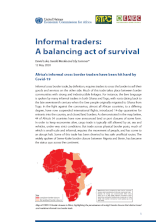Informal traders: A balancing act of survival

Informal cross border trade, by definition, requires traders to cross the border to sell their goods and services on the other side. Much of this trade takes place between border communities with strong and indestructible linkages. For instance, the Ewe language is spoken by many informal traders in both Ghana and Togo, with roots dating back to the late seventeenth century when the Ewe people originally migrated to Ghana from Togo. In the fight against the coronavirus, almost all African countries, to a differing degree, have now suspended international flights, introduced 14-day quarantine for entrants into the country, and closed land borders. As demonstrated in the map below, 44 of Africa’s 54 countries have now announced land or port closures of some form. In order to keep economies alive, cargo trade is typically still allowed by air, sea and vehicles, under very strict conditions. But trade across physical border posts, much of which is small-scale and informal, requires the movement of people, and has come to an abrupt halt. Some of this trade has been diverted to less safe unofficial routes. The widely spoken of Seme-Krake border closure between Nigeria and Benin, has become the status quo across the continent.